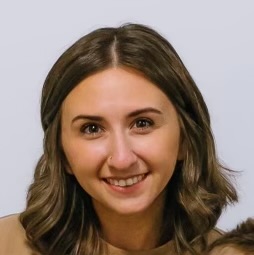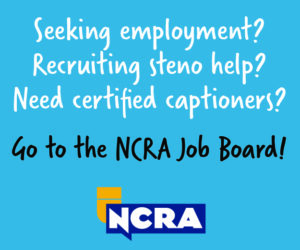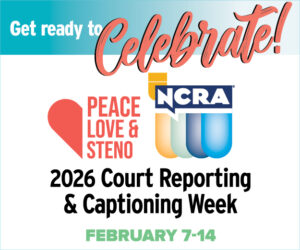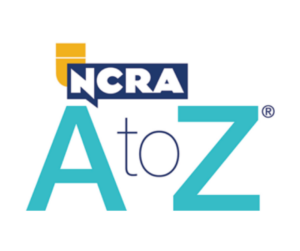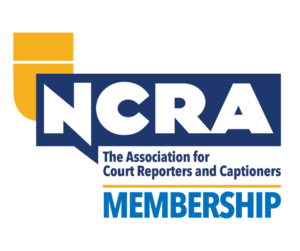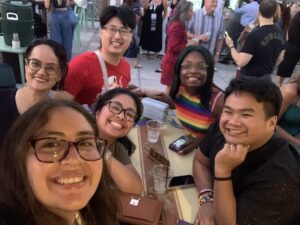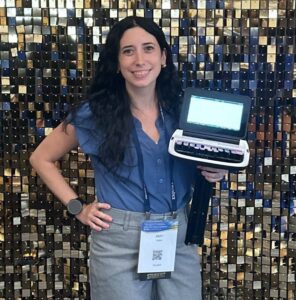Emily Eastwood, a student at Green River College in Auburn, Wash., has worked throughout the United States, including at National Parks, on dude ranches, and for elk hunting outfits. An encounter with an official reporter led her to finally settle down (for a while anyway). Someday, she’d like to pack up her steno writer and head overseas.
UTS | Why court reporting? What led you to the profession?
EE | A friend of mine, who is now my mentor, is an RMR and has been an official for 50 years. When I met her on a dude ranch in Colorado, she introduced me to court reporting. I was amazed that it met every requirement I was looking for in a career: Challenging, lucrative, having the ability to be freelance, a trade, something that I can have great pride in, the ability to contribute to a much larger picture, being able to offer my skills and services pro bono when the opportunity arises, an incredible community, and being of value.
UTS | Before enrolling in a court reporting program, you tried out steno through the NCRA A to Z® Intro to Steno Machine Shorthand program. What kind of difference has that made in your journey?
EE | [The NCRA A to Z program] was instrumental in my ability to learn theory with ease once I started school. I distinctively remember having an easier time than some during my first quarter in theory.
UTS | How do you like the program at Green River College?
EE | I love it. Being able to attend classes in-person post COVID was huge for me. It is the reason I moved to Washington to attend their program. I get access to 12 hours of live dictation a week, I get to interact with my fellow students via our club Discord that has students from theory up to 200 wpm in it. We have guest speakers come talk to us every month. I get access to well over 18 hours a week of other supplemental dictation and practice material. And I get access to captioning classes, software classes, procedures classes, internship classes, medical classes, and many more.
UTS | What do you love about stenography?
EE | I love the uniqueness of stenography while also having a vast community of reporters willing to help. There’s nothing quite like it. Everyone’s school journey is so unique to them, but then I follow people on Instagram who are reporters or captioners from all over the country and I get to see them at the annual Conference. It’s a special experience.
UTS | You won a free registration to the NCRA Conference & Expo in Louisville last summer. What was that experience like for you?
EE | I feel as though the Conference in Louisville last summer quite literally changed the trajectory of my career. I was able to meet with some amazing people who I otherwise would’ve never met. I learned so much, both from the sessions and from the people I met. I feel confident that the contacts I made will be a part of my career for a long time. I was also able to talk to students from across the country who are all having different experiences as well. I will be a lifelong attendee of the NCRA’s annual Conference & Expo.
UTS | What would you say to someone who is considering a career in court reporting or captioning?
EE | I would say do it. As the outreach coordinator for my program, it is important to me to paint an accurate picture for prospective students. I would say it will be challenging, school will be hard, but it will be the hardest thing you do. Working as a court reporter will be the most rewarding thing you do. There’s a reason the average age of working reporters is so much higher than in other fields. It is because people who do this job genuinely love it, and you don’t find that in a lot of other professions.
UTS | What is a piece of advice you have received that has had a significant impact on your life or career?
EE | I’ve received an abundance of impactful advice over the last couple of years, it is hard to pick one. I’d say my tops are: School is the hardest thing you’ll do, the tests can’t hurt you (seems ridiculous, I know, but tell that to my test anxiety), and that there’s no such thing as being in school for too long; you’ll never learn as much as you do in school.
UTS | What is your dream job? Where do you see yourself in five years?
EE | My dream job would be doing international arbitrations/depositions. In five years I see myself out of school, working for a wonderful firm here in Seattle, and moving closer to my goal of traveling the world with stenography.
UTS | Is there anything else you would like to share?
EE | I’d like to share that I am absolutely a product of the people around me and the people who’ve helped me through school. To Maryann, Kristin, Taylor, Lisa, Kore, Micheal, and everyone else I’ve met along the way, thank you. I would be nothing without you.
Missed previous issues of Up-to-Speed? Access them here.
